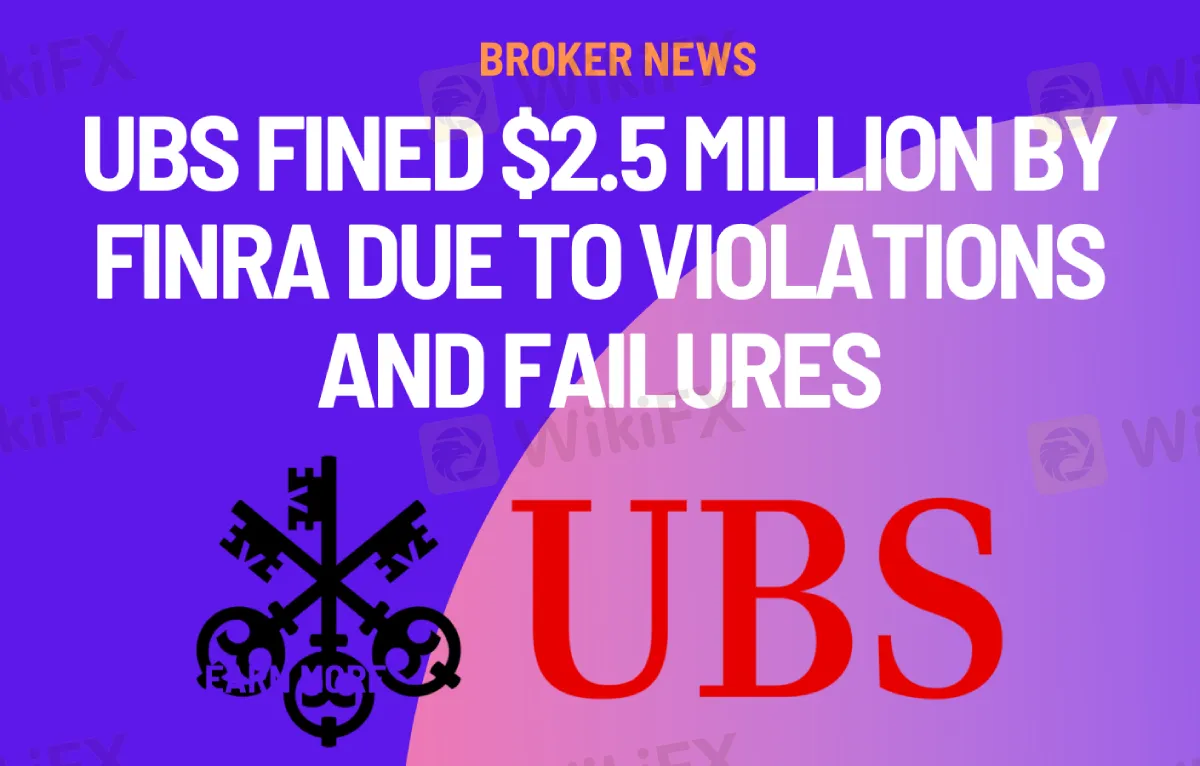简体中文
繁體中文
English
Pусский
日本語
ภาษาไทย
Tiếng Việt
Bahasa Indonesia
Español
हिन्दी
Filippiiniläinen
Français
Deutsch
Português
Türkçe
한국어
العربية
UBS Fined $2.5 Million By FINRA Due To Violations and Failures
Abstract:According to the US regulator, from 2009 to 2018, UBS failed to complete at least 5,300 failure to deliver positions and routed or executed more than 73,000 short sells in securities with an unmet close-out requirement without first borrowing or arranging to borrow the shares.

According to the US regulator, from 2009 to 2018, UBS failed to close out at least 5,300 failure to deliver positions and routed or executed more than 73,000 short sales in securities with an unfulfilled close-out requirement without first borrowing or arranging to borrow the shares.
“The short sale duties established by Reg SHO provide vital protection to the markets and investors,” Jessica Hopper, Executive Vice President and Head of FINRA's Department of Enforcement, stated.“ ”Effective supervision focuses on every step of a firm's Rule 204 compliance, including testing to ensure that systems and programming function as intended and without unintended effects.
Reg SHO prohibits “naked” short selling.
Reg SHO targets recurrent delivery problems as well as possibly abusive “naked” short selling (the sale of securities that an investor does not own or has not borrowed).
The regulation compels businesses to take deliberate action to close out “failure to deliver” positions arising from short sells of equity securities by borrowing or acquiring the securities before the start of normal trading hours the following day.
Close-out requirements are not met by limit orders or other delayed transactions. When a business fails to close out a failure to deliver, the regulation precludes the firm from taking new short sell orders in the security without first borrowing or arranging to borrow the security (often referred to as the “penalty box”).
Certain buy-in orders were routed as limit orders using UBS's VWAP algorithm.
According to FINRA, UBS violated Regulation SHO Rule 204 by:
Using revocable volume weighted average price (VWAP) transactions or restricting orders to address buy-in obligations that fail to be fulfilled
Consider shares freed from segregation as a result of client long sales that are available to close out a failure to deliver; and
Certain order management systems do not always block short sales in securities with an unfulfilled close-out requirement.
FINRA determined that UBS's supervisory systems were not adequately structured to achieve compliance with the standards of Reg SHO Rule 204 from 2009 to August 2022. The bank failed to recognize its unlawful handling of shares related to a customer-long sale.
UBS also ignored red warnings in its books and records showing that its VWAP algorithm routed some buy-in orders as limit orders. UBS also admitted to only fully enforcing Rule 204's “penalty box” following a technology breakdown.

About FINRA
Congress has given FINRA authority to safeguard American investors by ensuring that the broker-dealer sector performs fairly and honestly. We supervise over 624,000 brokers around the nation and evaluate billions of market occurrences every day.
We employ cutting-edge AI and machine learning technology to monitor the market and assist investors, regulators, policymakers, and other stakeholders.
WikiFX has been collaborating with FINRA for quite some time to address complaints made by allegedly FINRA-regulated scam brokers.
If you have any concerns about scams, please contact WikiFX Support using the information provided below.

More information on UBS may be found on WikiFX's dealer page at https://www.wikifx.com/en/dealer/5081972641.html.
Keep an eye out for more regulatory updates.
WikiFX may be downloaded via the App Store or Google Play.

Disclaimer:
The views in this article only represent the author's personal views, and do not constitute investment advice on this platform. This platform does not guarantee the accuracy, completeness and timeliness of the information in the article, and will not be liable for any loss caused by the use of or reliance on the information in the article.
Read more

Doo Financial Expands Regulatory Reach with Offshore Licenses in BVI and Cayman Islands
According to the report, Doo Group, a prominent Singapore-based online brokerage firm, has strengthened its global presence by securing new offshore licenses for its brokerage brand, Doo Financial. The company recently announced that entities under the Doo Financial umbrella have been granted licenses by two key offshore regulatory bodies: the British Virgin Islands Financial Services Commission (BVI FSC) and the Cayman Islands Monetary Authority (CIMA).

Why is there so much exposure against PrimeX Capital?
In recent months, PrimeX Capital, a Forex and CFD broker established in 2022, has become a subject of concern in the trading community. However, despite these enticing features, the broker's reputation has been severely tarnished by multiple complaints and a troubling lack of regulatory oversight.

The Hidden Checklist: Five Unconventional Steps to Vet Your Broker
Forex broker scams continue to evolve, employing new tactics to appear credible and mislead unsuspecting traders. Identifying these fraudulent schemes requires vigilance and strategies beyond the usual advice. Here are five effective methods to help traders assess the legitimacy of a forex broker and avoid potential pitfalls.

Doo Financial Obtains Licenses in BVI and Cayman Islands
Doo Financial, a subsidiary of Singapore-based Doo Group, has expanded its regulatory footprint by securing new offshore licenses from the British Virgin Islands Financial Services Commission (BVI FSC) and the Cayman Islands Monetary Authority (CIMA).
WikiFX Broker
Latest News
AIMS Broker Review
The Hidden Checklist: Five Unconventional Steps to Vet Your Broker
Russia to Fully Ban Crypto Mining in 10 Regions Starting January 1, 2025
YAMARKETS' Jingle Bells Christmas Offer!
Why is there so much exposure against PrimeX Capital?
Doo Financial Expands Regulatory Reach with Offshore Licenses in BVI and Cayman Islands
MTrading’s 2025 "Welcome Bonus" is Here
Doo Financial Obtains Licenses in BVI and Cayman Islands
CFI’s New Initiative Aims to Promote Transparency in Trading
Currency Calculator


